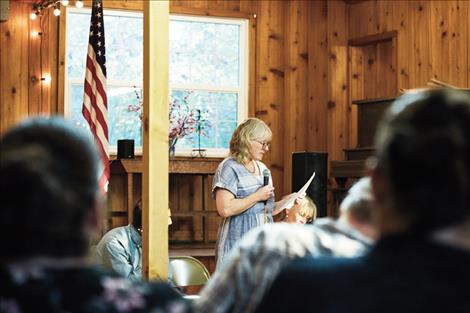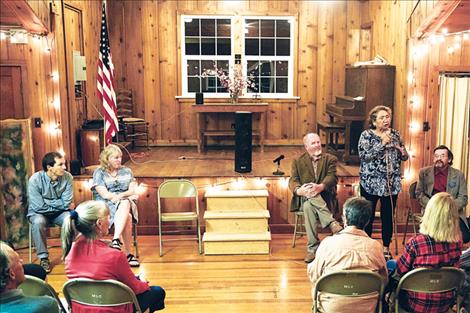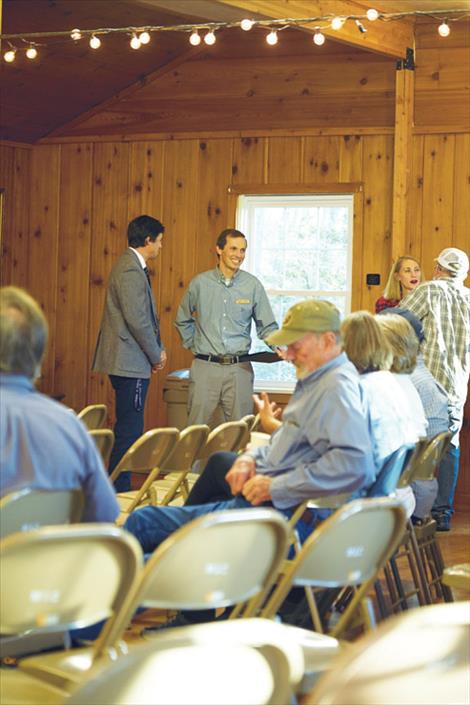Democrats, Republicans debate at political forum
Hey savvy news reader! Thanks for choosing local.
You are now reading
1 of 3 free articles.
POLSON — On Oct. 3, all Democrat and Republican candidates from HD 12, HD 15, HD 93 and SD 8 were invited to participate in a political forum hosted by the Montecahto Club. Of the nine total candidates, five were able to attend the forum, with Jill Read presenting prepared answers for Linda Rekston (R-incumbent HD12) who was out with Covid.
Moderated by Polson High AP government teacher Thomas Benson, many key issues were presented to the candidates, along with additional questions from the audience for each candidate. The forum discussed community issues from the housing shortage to education to what should be done with the state’s current surplus.
Benson started by asking the candidates about how they would address the housing shortage in Lake County and across the state. Joe Read (R-incumbent HD93) and Susan Webber (D-incumbent SD8) both agreed that state policy and zoning laws inhibit and discourage local communities from taking effective action in providing more affordable housing.
“Montana is 45th in income, but is the 11th fastest growing state in the nation,” Webber said. As the wealth gap increases, she continued, people get poorer and poorer and don’t have the opportunity to build a home or even seek family units.”
Shirley Azzopardi (D-candidate HD93) went into more specifics, saying there needs to be a multi-pronged plan.
“At the state level, the Multi Family Coal Trust Program could provide low interest loans to developers and contractors who build affordable rental homes,” Azzopardi stated. “Second would be creating an additional housing trust fund with the revenue surplus to facilitate the construction or conversion of existing homes to affordable housing through tax credits. And at the county level, create and enact zoning laws that allow more high-density affordable housing.”
All candidates agreed that something needs to be done to help the community become safely housed, particularly low income and young people.
“The current younger generations will be the first in American history to be poorer than their parents, and housing has a lot do with that,” Sterling Laudon (D-candidate HD12) said.
Benson followed up asking what policies the candidates would favor addressing Montana’s budget surplus. Rekston, Webber and Azzopardi all stated mental healthcare access in rural communities was of the utmost importance.
“There is currently a proposal using surplus money to build a regional mental health system that is more accessible to citizens and solve the problems of Warm Springs,” Rekston wrote.
“One in five children in Montana have considered suicide, while two in five show signs of depression. Rural Montana lacks access to any mental healthcare, and I’d like to expand the availability of community based treatment,” Azzopardi said. In addition, she stated she would like to create a Mental Health First Aid team in the community to assist law enforcement dealing with mental health issues. “Police Officers in the community frequently deal with people having mental health crises and, by law, those officers have to stay in the hospital until they are stabilized. And that takes an officer off the streets and away from work that needs to be done,”
Ralph Foster (R-candidate HD15) spoke about using the surplus to modernize technology used state agencies and welfare reform.
“As someone who works with the state agencies, modernization is something vastly needed. The state is using Internet Explorer, which went out of service in 2014,” Foster stated. “In addition, welfare reform is greatly needed. By reform, I don’t mean taking benefits away. Did you know you can’t purchase toilet paper, toothpaste, shampoo or anything like this? You need to expand benefits and raise dollar limits. This will aid in the search for housing and help you to get to the point you can come off the that sort of assistance,” Foster explained. He added that picking one or two simple things that would benefit those who really need help would be the best ways to use the surplus.
Azzopardi and Laudon both emphasized that investment in infrastructure programs would be the most useful due to their longevity.
“Infrastructure projects make sense because they have a lasting effect, even after the surplus might be gone. Communities like Charlo, Arlee, and St. Ignatius have limited tax bases, so it becomes really hard to upgrade water and sewer systems because it’s so expensive,” Azzopardi explained.
“The heating and cooling systems are things that really need to be updated. The kids need to be in a good environment where they can learn.” said Laudon, weighing in on the need for infrastructure. “Inflation and higher energy costs, that really hits people in lowest income level the most. A one-off you do as a tax credit, targeted at children, especially by increasing the child tax credit gets to the people who need it the most. Federally this credit had a huge effect in reducing poverty in children. If we target it in the same way, it could have a huge effect,” he added.
Read, however, differed from the rest of the candidates on what he thought should be done with the funds.
“The surplus money isn’t really surplus, it is there and will be asked for. There was a special session request, that I voted for, and in that session there was only two questions. ‘How are we going to give this money back and who are we going to give it to?’” Read stated. “What wasn’t asked was, that it won’t go back to the state’s reservations because the majority of tribal members don’t pay property or income taxes and are taxed in other ways. Every agency wants that money and if we give it to them, you are growing government. That bill will still exist in two years, but the surplus may not.” He proposed returning the money to the counties would be the best solution. He reasoned this would allow problems to be solved at the local level and benefit communities the most.
The third question regarding Montana’s Judiciary and if it was functioning as it should showed some differences down the party line. Laudon, a district attorney, championed the non-politicization of Montana’s courts.
“We just want people who are professionals, who have experience and deliver the best set of laws for us,” Laudon commented. “The incumbent in this current election has decades of legal and judicial experience, while the challenger is clearly a partisan who is way under qualified and way under experienced.” Additionally, he voiced his support of the Montana constitution’s enhanced right to privacy, and stated the challenger is only there to compromise it. “I think the Montana Supreme Court is functioning pretty well,” he added.
Both Rekston and Read stated they thought the courts need to be changed, but for slightly different reasons. Rekston said he believes the court has been politicized and has violated the Montana constitution, while Read said he thinks the court’s decisions on the recent voting bills need to be addressed.
To wrap up the night, questions were asked about education and healthcare. While all candidates said teachers and schools needed higher pay and more funding, as well as more technical training and vocational options for students, the biggest divide was about public schools versus the funding of private and charter schools and the voucher system.
Both parties agreed something needs to be done about the high costs of healthcare. Read and Webber both expressed they want laws passed enforcing transparency and itemized billings from healthcare facilities and practitioners.
Foster went as far as saying he was for socialized healthcare, and shared the personal story of losing his first wife and dealing with costs of cancer treatment for his current wife. He emphasized that many professions already have some form of tax paid healthcare, including teachers, federal and state workers, low income, Native Americans through tribal health and veterans. He added it would be very simple to expand these to everyone.
At the end of the forum, both the Lake County Republicans and Democrats thanked the candidates and each other for being able to put on such an informative and civil night, where policies and opinions weren’t avoided, and animosity wasn’t the attitude. They expressed all Montanans and want the best for our friends and families, even if there are different ideas of how to get there.


















